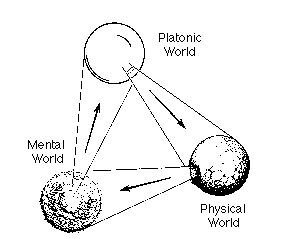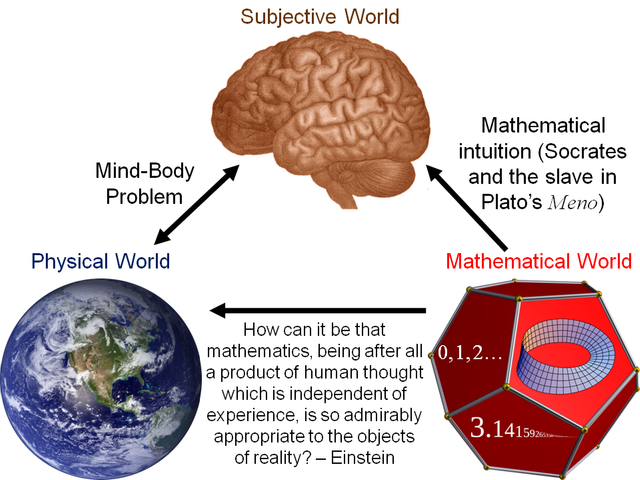Are there 3 worlds that are fundamentally different ?

Today I looked at Roger Penrose's three worlds diagram and discovered mathematical platonism
Although I had never read about these things before, they closely relate to my own ideas about the simplicity and beauty of self-consistency conditions that are present in logical structures, i.e, mathematics. The universe is a strictly self-consistent system evolving according to it's own rules which we call laws of physics. These rules are isomorphic to mathematical structures, and all fundamental interactions (forces) are geometrizable, thus mathematics is truly nature's language (not just a human artifact). A modern version of this kind of radical Platonism is Tegmark's Mathematical universe hypothesis
Perhaps existence is possible because perfectly consistent (i.e, without contradictions) logic exists, and higher mathematical structures are derived from these axiomatic truths.
Penrose's diagram indicates that a small part of the Platonic (mathematical) world describes everything in the physical world, a small part of the Physical world is experienced as perception / phenomenon in the mental, subjective world and only a small part of the Platonic world is accessible/ comprehensible to us, in the mental world.
Here's another version of the same diagram :

He says "only a small part of the Platonic world is accessible" because it is not possible, not even in principle for us to prove all true mathematical results due to Godel's incompleteness theorems , which arise from self-reference problems, i.e, when we try to "prove" a truth about a language (which is sufficiently complex) within the rules of the language. I can share a 40 minute long video that explains this result very well (using diagonalization ) which I'll link if anyone is interested.
The isomorphic relationship between the physical and mental world is obvious, yet remains beyond our grasp. Which indicates that we are dealing with two things that are fundamentally different, this is popularly known as the "hard problem of consciousness" .
Panpsychism is one way out, which attributes the quality of consciousness or "sentience" (which is not to be confused with the ability of self-reflection, but is a very primitive form of "sensation", what it feels like to "be" ) to everything in existence, but in varying degrees . Even though this is an extremely counter-intuitive and a rather absurd position, there really is no way one can either prove or disprove it within the realm of physics. In other words, modern physics allows it.
Integrated information theory , a modern theory attempting to explain consciousness, is in fact a loose form of Panpsychism.
One of its leading proponents, Christoph Koch , is a panpsychist himself.
I believe posts like this will eventually do quite well for you. Keep at it. Don't be discouraged. Write the things you LIKE rather than trying to find the things people like. If you do that the followers and money will come. Yet, by then that'll be a plus, but you'd likely be happy your ideas and creations are forever stored in the blockchain.
Keep up the good work. This was a well thought out post.
Thanks again!
In my opinion there is no such thing as consciousness. Our bodies develop random electrical signals that deal with our environment. The universe is constantly expanding and thus becoming more and more entropic.
It has been postulated that in order to predict how many billiard balls will end up in specific holes at the first brake you will need some pretty accurate mathematics. It could be probably be done. By the time though you start predicting the 5th hit on the game one would need to take into account the gravitational pull of the sun. For the 7th hit you would need to take into account the placement of every single atom in the known universe.
That's how entropy rules everything. I will try and search for the math (had them somewhere and post it here)
" no such thing as consciousness" Why do you think that?
Because I have no evidence for such a concept and everyone defines it differently. Same thing as "love" or "god". What can be asserted without evidence can be dismissed without evidence.
Does "pain" exist? Or can it be "dismissed without evidence"?
I guess there will be a point in your life when the concept of defining pain as "random electrical signals" will collapse.
You are much more than your brain, though your brain prefers to position itself as the ultimate king. Especially the case when the brain is very effective, like yours.
Depends how you define pain. If for example you define pain as the defense mechanism upon which all forms of life have in order to preserve their physiology then it can be demonstrated that it exists even in plants.
In humans pain appears as something unpleasant and we back off from what is causing it. In plants we preserve similar effects.
Yes, we have pain in plants. Which only proves my point: these things are very very old thus very real. Actually they are more real than anything you can imagine. They are meta-real.
oh. now you went full namaste
I don't think so. You question the realness of anything that cannot be scientifically proved. I find it quite limiting and actually useless. Useless in that sense that in order to live we need to know how to live and science does not deal with that.
My approach is different. I treat evolution seriously: as the mechanism which reveals the ultimate truth. Thus anything that survived the process of evolution is real, and very old concepts like "time", "god", "sacrifice", "consciousness", "pain", "suffering", "chaos/order", "good/evil" are very old thus very real.
Applying to those concepts the requirement of scientific evidence is similar to requiring that I prove to you that e.g. numbers exist. Are numbers real? They are meta-real, they exist as an abstraction so they are more real than their actual implementation. The concept of numbers survived the human evolution so it's real.
You could be a philosophical zombie https://en.wikipedia.org/wiki/Philosophical_zombie , that can perform all the functions of a real organism, but doesn't require consciousness. The "random electrical signals" that deal with our environment can function perfectly well without needing someone to experience them .
But we are philosophical zombies copying things that others have left before us. We don't do anything different other what our DNA does throughout its replication and consequent variations. All life follows the same path.
Where does the "subjective" world fit in if you're a zombie?
"A philosophical zombie or p-zombie in the philosophy of mind and perception is a hypothetical being that is indistinguishable from a normal human being except that it lacks conscious experience, qualia, or sentience.[1] For example, if a philosophical zombie was poked with a sharp object it would not feel any pain sensation, yet could behave exactly as if it does feel pain (it may say "ouch", recoil from the stimulus, and say that it is feeling pain)."
Lol